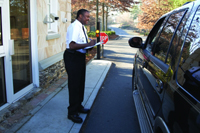Gated communities and condominiums that employ security officer services understand that residential security goes above and beyond safety. Security personnel are the first impression of a residential property for homeowners and visitors.
Points to consider when evaluating residential security:
1. Access Control that is Truly in Control - Monitoring access requires continual, uninterrupted vigilance. Too many security providers let visitors call the shots. It is important that the security provider is 100% accurate on who they are allowing access. Is the visitor logged into the system by the tenant as granted evergreen access, or expected on this particular day only? If this visitor is not on any list, security must call the tenant to verify access. If the tenant cannot be reached, the visitor cannot proceed.
2. Professional Presence and Actions - As the security officer is often the first person a visitor or tenant sees when entering a property, their appearance and presentation is critical. Customer service driven security professionals who are well-mannered, well-trained and patient are crucial to providing a safe, secure and friendly environment.
3. Attention to Technology - Today's security officer may be patrolling the community on a Segway, completing online incident reports or piloting a host of IP-connected digital applications that include closed circuit television (CCTV), life and fire safety systems, and remote online access control. The officers assigned to your community need to be up to the task.
All security programs are not the same. A residential community has different, and often more sensitive, security needs as people's homes are being protected. A security provider – and team – with the right skills and experience can make a significant impact on the safety and security of your residential community.
 About the Author
About the Author
Andrew Daniels is the Vice President of Business Development for the Southeast Region at Allied Universal.









